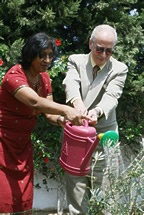
The UN opened its first human rights office in Tunisia, with the world body’s top rights official lauding the country for inspiring the quest for political reform and human dignity across North Africa and the Middle East with its own popular uprising earlier this year. High Commissioner for Human Rights Navi Pillay formally opened the office in the capital, Tunis.
“The whole world watched with amazement and growing respect as Tunisians kept demanding your rights, refusing to be cowed by the repression, the arrests, the torture and all the injuries and tragic loss of life that occurred, The impact of these actions, on Tunisia itself, on the wider region, and indeed all across the world is hard to measure and is far from completed. But it has unquestionably been enormous and truly inspirational,”
First in Region:
The new office is not only the first in Tunisia, but also the first one in any of the five North African countries bordering the Mediterranean Sea. (From UN News Centre Sources) Ms. Pillay noted that although the Tunisian transition was also far from over, great strides had already been made since the ouster of the long-standing regime of Zine El Abidine Ben Ali earlier this year. Tunisia had ratified four important international treaties, including three in a single day – the Optional Protocol to the International Covenant on Civil and Political Rights; the Optional Protocol to the Convention against Torture; and the UN Convention on Enforced Disappearances, all ratified on 29 June.
International Criminal Court:
A week earlier, on 24 June, Tunisia had become the 116th State to ratify the Rome Statute for the International Criminal Court (ICC), and the first country in North Africa to do so. Ms. Pillay also pointed out that there were more than 80 officially registered political parties, compared to only seven before the revolution, and that Tunisia had become the first country in the Arab world to legally enshrine gender parity in the electoral rolls for the upcoming elections.
Significant Role of Women:
She stressed that women played an important role in the protests against the previous repressive regime and achieving true parity with men in the new Tunisia will be an important factor in the country’s social and economic development. It is also vital that Tunisian youth are given hope for the future, having played a key role in the protest movement. “Their full involvement in the evolution of the new State is essential if it is to remain forward-thinking and dynamic,” Ms. Pillay added.
The High Commissioner marked the occasion of the opening of the first UN human rights office in the region by planting an olive tree, “a simple symbolic act which I believe encompasses all the hopes we all have for the new Tunisia. I therefore hope that the olive tree […] will reflect the advent of a new era of human rights and democracy in Tunisia. And that, 2,000 years from now both this tree and Tunisia can look back on 2011 as the magical year when it all began,” (PHOTO ABOVE)
RELATED ARTICLE “Arab Revolutions – How Far?”
diplomaticallyincorrect.org/films/blog_post/arab-revolutions-how-far-by-ambassador-mo/25222
FILM REPORT – “Tunisia Democracy- Jasmen Freedom” -
diplomaticallyincorrect.org/films/movie/tunisia-democracyjasmen-freedom/24460
More Reports – “War Crimes Justice” Channel -
diplomaticallyincorrect.org/c/war-crimes-justice
By Ambassador Muhamed Sacirbey
Facebook Become a Fan at “Diplomatically Incorrect”
Twitter – Follow at DiplomaticallyX

